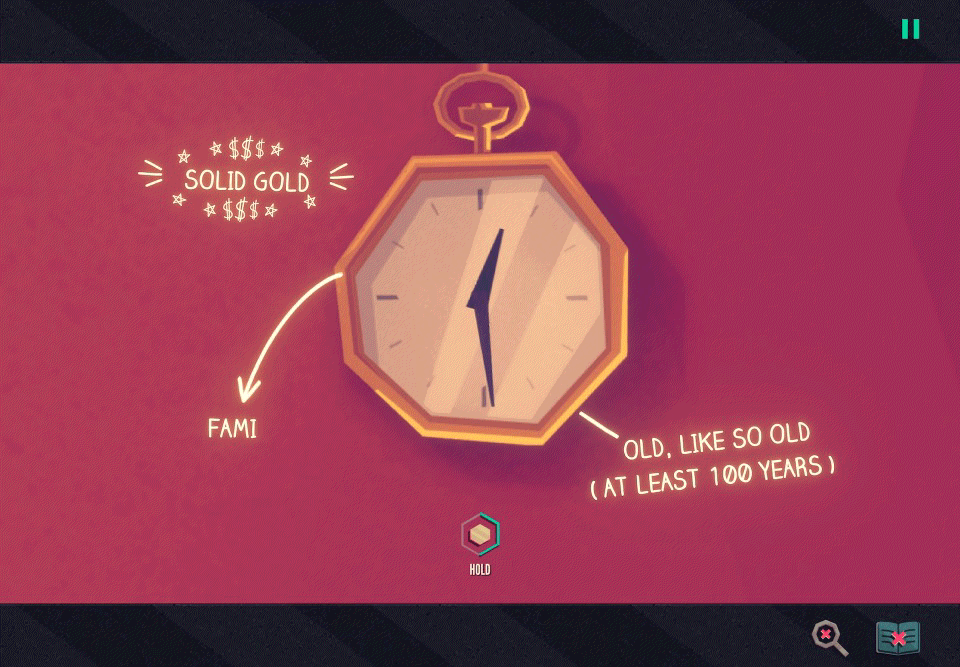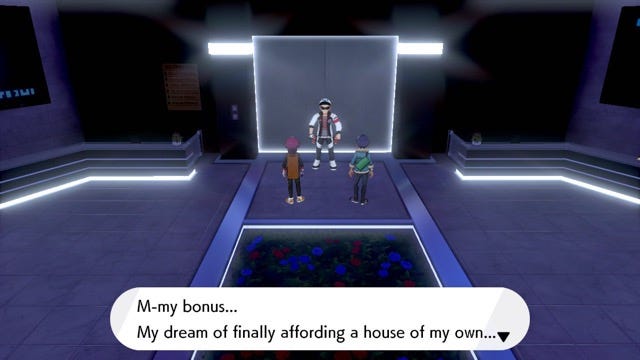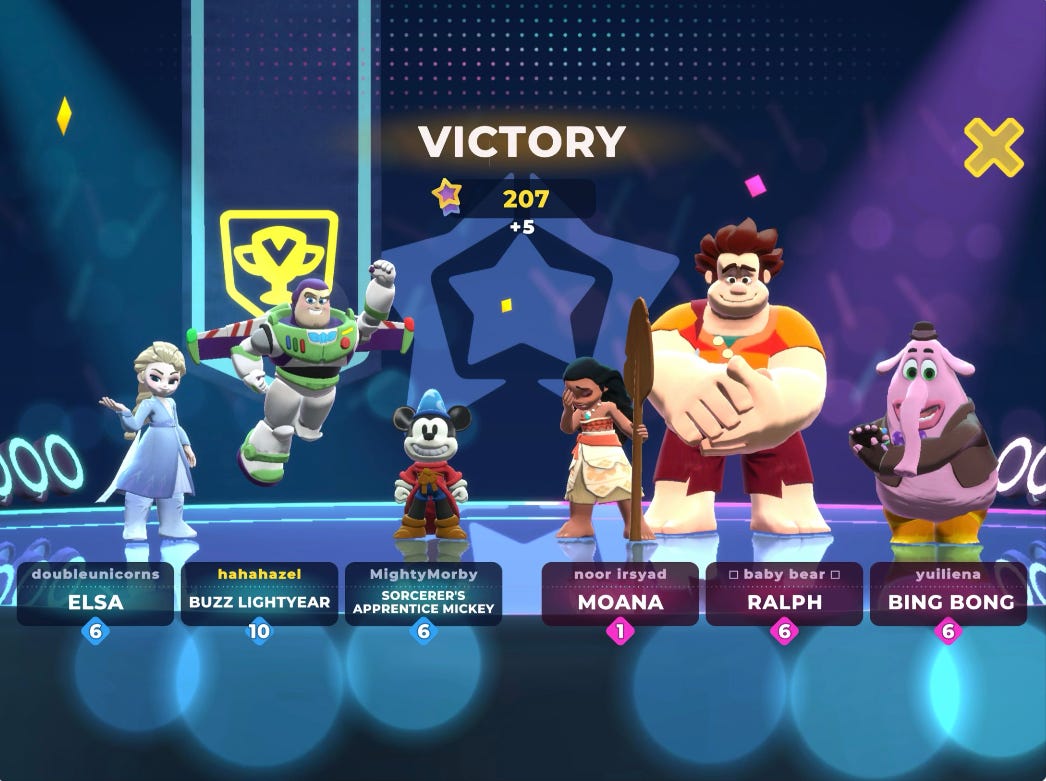Jenny LeClue
A rhyming, rollicking mystery adventure game that doesn't quite live up to an ambitious premise.
Jenny LeClue is a detective puzzle game about an author writing a mystery novel. It has the feel of a Sunday cartoon: breezy narrative, quippy characters, and a playful plot. It’s also the game I have the most complicated feelings about of any Arcade game I’ve played so far.
The game introduces itself in three scenes. The arrival of “the man in black” to the town of Arthurton, the discussion between the author, Arthur K. Finklestein, and his agent about the poor sales of new books, and a forensic class Jenny helps her mother with. You see, Jenny is a fictional character, the lead of the books Arthur K. Finklestein has written. His books have gotten boring and his editor wants him to add danger and excitement to the 39th in the series. You play the characters as he writes them.
Two hours into the game and I was ready to declare this one of the greatest Apple Arcade games, easily in the top 5 and a must-play. The game felt designed for me to love it. The writing was sharp and the different puzzles offered interesting situations that connected to the larger story.
Ten hours later my feelings were more mixed and confused.
An Incredible Start
The intro scene, a day in your mother’s class, teaches you the tools of the interface, gets you up to speed on your relationship with your mother and the people around you.
It also highlights my favorite part of Jenny LeClue. It was most successful in the interrogations, where you’d have to scan someone for clues. The cursor, a small diamond in the middle of the screen (on mobile), lights up when you find something of interest and there’s also a helpful counter at the top of the screen letting you know how many more clues you have to find. Each time you find an item, you get to tap to get extra details about the character.
The game primarily consists of interrogations that you use to collect information about a character, puzzles that unlock narrative, connection moments where you unlock insights that move the story forward and more traditional hidden objects in rooms that you can use to gather items that might be helpful in the future. It's an excellent combination of ideas that make the game feel alive and like a real mystery. Combine that with beautiful settings and excellent art and you have a product that's enchanting to engage with. The UI of the game feels like it wants you to be successful, even as the game challenges you. Interrogation scenes tell you how many clues you have left to find to drive that sense of progress, and the game will let you know when you should jump in magnifying mode to find a hidden clue. The game also breaks itself up into smaller cases to solve, to give you short-term goals to focus on.
I also enjoyed the "meta-narrative" elements, where the author (Arthur) "speaks" to the characters in small moments. Like when Jenny gets scared and he has to remind her that she's a brave detective, or when he acts surprised that she does something out of character. This conceit works well in a game where you sit sort of in between the two settings. You're playing as Jenny and so the interjections add novelty and interest to what could otherwise be a straightforward story. It feels almost like you're playing an animated TV show, in a really cool way.
I like games that make me feel smart and Jenny LeClue makes me feel smart. The story is another matter.
The Story of It All
I guess it’s time to talk about ludonarrative dissonance. Ludonarrative dissonance is a fancy way of talking about how much the "gamey" portions of the game disagree with the narrative portions of the game. In A Game Design Vocabulary, Anna Anthropy talks about the two concepts as the narrative story (the one the author of the game tells you) and the emergent story (the one that you playing the game create).
The dissonance was supposed to be a reference to the disconnect between the authored story and the emergent one. I.e. is it dissonant if you have a narrative that's linear, but the game lets you die over and over again? It used to be an open question how much a game should care about the authored narrative at all, but these types of theoretical discussions can feel disconnected from our experiences when we play games. The human brain has an incredible ability to paper over those dissonances as long as they're enjoying the various stories being told. But the dissonance between playing a game and enjoying the storytelling of that game is a real experiential problem. In the case of Jenny LeClue it pops up because the puzzles get plugged into a meandering narrative that doesn’t lead anywhere.
Each game sets different expectations for the relationship between the play and the story. For example, no one would really fault Pokemon for having a plastered-on story that’s been remixed to death. The story is quite obviously not the main driver of a player’s experience. It’s an extra flavoring that enhances the emergent story: becoming a strong trainer.
But Jenny LeClue asks you to care about the narrative quite a lot. You play the game to literally and figuratively uncover the mystery. In individual moments, the writing works. Each individual case has a clear goal, and the story works with the puzzles to lead you toward a conclusion. Jenny LeClue plays around with a bunch of interesting themes like loss, mental illness, and personal growth.
But the sum of all of the cases and the scenes didn’t add to a complete narrative. For one thing, the game is pretty slow. Playing 12 hours for the story as it is is a lot to ask. In general, I think games should be shorter, but if a game is going to be 12 hours long, the story, like the cases has to give meaningful payoffs to the questions it asks as the game progresses. For example, a traditional audiobook takes about 12 hours, so the payoff for that experience should be roughly equivalent I think. You might say that other games with less story (like Breath of the Wild), get played for 70+ hours, but I would argue that Breath of the Wild is notorious for creating payoffs behind every corner of the game.
Not only is the game, long, it literally ends on a “To Be Continued”. I don’t think games have to wrap everything up nicely, but to end on a surprise “to be continued” was a huge letdown. In fact, mid-way through I wrote “this feels episodic”, but it wasn't until I looked at the Kickstarter page and that the project was promised to be a three-part series.
This campaign hopes to fund the first episode of the envisioned trilogy with stretch goals fueling the other two episodes. If we only fund the first episode, it will be a self-encapsulated story and will not leave players hanging. We plan on completing episode one by winter 2015, but have set the delivery date for winter 2016 in the case that we are able to deliver more than one episode. Any pledges over our goal will go towards making the experience richer and creating episodes two and three.
More disappointingly, not only is the main thread left unresolved, smaller stories like any information about the mysterious “Man in Black”, Jenny’s relationship with her new friend Suzy Glatz, or the resolution of her emotional breakdown in front of her long-time friend Keith. And none of this progressed the impetus of the initial story, which was how is Jenny growing as a fictional/literal character?
This isn’t dissimilar to how Double Fine famously cut Broken Age into two parts. But the key part was that each part functioned as a cohesive story. But while Broken Age struggled with challenging puzzles preventing players from making it through the game, Jenny LeClue’s puzzles shine.
The End?
Jenny LeClue is a well-produced game with a wealth of interesting ideas that fell under the weight of its own ideas. At the start, I loved how many genuinely cool ideas popped out of the game, and I can feel the thought and care that went into each element. All of the puzzles and cases stand on their own as fun experiences. But ultimately the game didn’t use those experiences to say much of anything. I’m excited to see the ideas in future games and I’m curious how Part 2 of Ms. LeClue might resolve some of these issues.
Let’s Go 2022
So it’s 2022! Yay! We made it. With the (unannounced) week off, I decided to take the opportunity to reset how the blog will operate in the coming year. I’m going to walk through it all next week where I’ll discuss what Arcade did in 2021 along with some questions and predictions for 2022. As a bit of a sneak peek, I’ve made the decision to stop solely focusing on themes and go to a combo of reviews about new releases, all-stars of the service, and more general essays about mobile gaming. I’m doing this in part because I think that newer titles might attract new readers, but also because I don’t want to be stuck waiting to talk about Disney Melee Mania.
Part of my reasoning behind writing about games is it’s fun to talk about stuff that just seems off the wall, like Disney Melee Mania. I’m hoping the format will give a good mixture of relevance and freedom to explore different avenues.
Onto 2022!







